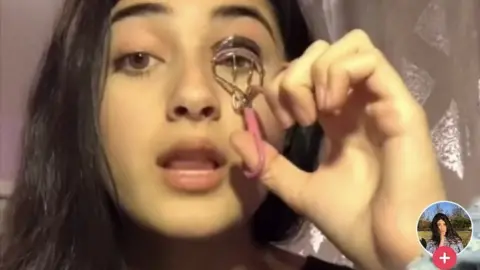TikTok apologises and reinstates banned US teen
Chinese-owned social network TikTok has apologised to a US teenager who was blocked from the service after she posted a viral clip criticising China's treatment of the Uighur Muslims.
The firm said it had now lifted the ban, maintaining it was due to 17-year-old Feroza Aziz's prior conduct on the app - and unrelated to Chinese politics.
Additionally, the firm said "human moderation error" was to blame for the video being taken down on Thursday for almost an hour.
TIkTok, owned by Beijing-based ByteDance, has insisted it does not apply Chinese moderation principles to its product outside of mainland China.
Ms Aziz posted on Twitter that she did not accept the firm's explanation.
"Do I believe they took it away because of a unrelated satirical video that was deleted on a previous deleted account of mine? Right after I finished posting a three-part video about the Uighurs? No.”
 TikTok
TikTokIn an interview with BBC News reporter Vivienne Nunis, Ms Aziz said: "I will continue to talk about it, and I will talk about it on Twitter, on Instagram, on any platform I have, even TikTok.
"I'm not scared of TikTok, even after the suspension. I won't be scared of TikTok.”
TikTok explanation
Eric Han, TikTok's head of safety for the US, said Ms Aziz had been banned earlier this month after she posted a video containing an image of Osama Bin Laden.
"While we recognise that this video may have been intended as satire," Mr Han said, "our policies on this front are currently strict.”
When TikTok bans users, it also prevents the same device being used to set up another account.
It was on a new account, set up on the same device, that Ms Aziz posted her video about the Uighurs, done in the style of a make-up tutorial, a popular genre on the network.
TikTok said that account was disabled after it ran a "platform-wide enforcement" that locked out Ms Aziz's device, as well as 2,406 devices belonging to other users who had fallen foul of the site's policies.
Mr Han wrote: "Because the user's banned account (@getmefamousplzsir) was associated with the same device as her second account (@getmefamouspartthree), this had the effect of locking her out of being able to access her second, active account from that device.
"However, the account itself remained active and accessible, with its videos continuing to receive views.”
 Reuters
ReutersBut on Thursday morning, the viral video - which has been viewed more than nine million times, across multiple networks - was also removed from TikTok, due to what Mr Han described as a "human moderation error”.
"It's important to clarify that nothing in our community guidelines precludes content such as this video, and it should not have been removed," he said.
"We would like to apologise to the user for the error on our part this morning.”
Rapid growth, added scrutiny
Human Rights Watch told the BBC that a lack of transparency is deserving of increased scrutiny.
"It is hard for outsiders to know the real reasons for the suspension of Aziz’s account," said Yaqiu Wa, the non-profit's China researcher.
"TikTok does not make public the data on the videos it removes or the users it suspends, or the artificial intelligence tools it uses to determine the removals and suspensions.
"While TikTok has repeatedly stressed that it does not take orders from the Chinese government in terms of what content it promotes or removes outside of China, it has done little to quench the suspicion, given that all Chinese companies are not only accountable to its shareholders, but also to the Chinese Communist Party."
The incident marks an early, high-profile censorship dispute for TikTok, a network which has exploded in popularity over the past two years.
Globally, the app has now been downloaded 1.5 billion times, according to mobile intelligence analysts Sensor Tower.
It looks set to end 2019 as the third most-downloaded non-gaming app, ahead of rivals Facebook and Instagram.
That surge in popularity has caused concern in Western markets, due to the nature of its Chinese ownership.
In the US, TikTok's deal to buy Musical.ly, a music-based social network, is now being examined by the US Committee on Foreign Investment in the United States. The committee is looking specifically at data storage and privacy practices.
In February the firm was handed the largest ever fine for a US case involving children's data privacy. The company agreed to pay $5.7m (£4.3m) over its handling of data on users who were under 13, acquired thanks to its takeover of Musical.ly.
_____
Follow Dave Lee on Twitter @DaveLeeBBC
Do you have more information about this or any other technology story? You can reach Dave directly and securely through encrypted messaging app Signal on: +1 (628) 400-7370
